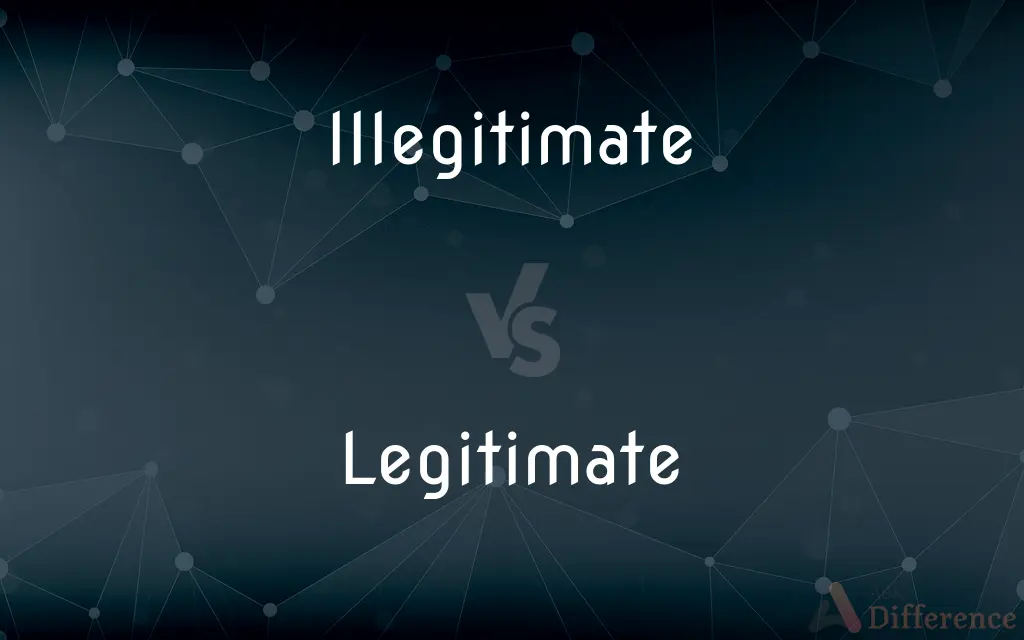Illegitimate vs. Legitimate — What's the Difference?
By Urooj Arif & Fiza Rafique — Updated on April 2, 2024
Illegitimate denotes something not authorized by the law or rules, lacking official recognition or validity, while legitimate means conforming to the law, being rightful, or recognized as valid and acceptable.

Difference Between Illegitimate and Legitimate
Table of Contents
ADVERTISEMENT
Key Differences
Illegitimate is often used to describe situations, actions, or entities that are not in accordance with established laws, norms, or standards, implying a lack of official sanction or recognition. In contrast, legitimate refers to anything that is lawful, justified, or accepted as right within legal or ethical frameworks, suggesting an adherence to recognized standards or rules.
In the context of children's birth status, "illegitimate" historically referred to children born outside of marriage, lacking legal recognition by the father. Whereas, "legitimate" children were born within a marriage or were legally recognized, granting them certain rights and social acceptance that illegitimate children were often denied.
When discussing authority or power, an illegitimate government or ruler is one that has seized power through non-constitutional means, without the consent of the governed or outside the rule of law. Conversely, a legitimate government is one that has been established and operates according to the laws and norms of the society it governs, often recognized internationally.
In terms of arguments or reasons, an illegitimate reason is one that is not acceptable or valid within a given context, possibly because it is based on false premises or irrelevant considerations. On the other hand, a legitimate reason is well-founded, justifiable, and relevant to the matter at hand, reflecting a rational and ethical basis for actions or decisions.
The use of the terms also extends to the authenticity of objects or practices. Illegitimate goods, such as counterfeit products, lack the authenticity or official endorsement that legitimate goods have, which are genuine and produced or sold with the proper authorization.
ADVERTISEMENT
Comparison Chart
Definition
Not authorized or accepted according to law or rules.
Conforming to the law or rules; rightfully recognized.
Legal Status
Lacks legal recognition or validity.
Recognized by law as valid and acceptable.
Authority/Power
Gained or exercised without legal or moral right.
Gained and exercised according to law and ethics.
Ethical Implication
Often implies unethical or unacceptable practices.
Implies ethical acceptance and adherence to standards.
Example in Society
Children born out of wedlock historically; counterfeit goods.
Children born within marriage; genuine products.
Compare with Definitions
Illegitimate
Not authorized by law or rules.
The business was shut down for conducting illegitimate activities.
Legitimate
Genuine; not counterfeit.
Only legitimate products are sold in this store.
Illegitimate
Born to parents not lawfully married to each other.
In the past, illegitimate children had fewer rights.
Legitimate
Conforming to the law or to rules.
The company’s operations are fully legitimate.
Illegitimate
Not genuinely or rightfully obtained or deserved.
The trophy was won through illegitimate means.
Legitimate
Justifiable; reasonable.
She had legitimate reasons for missing the deadline.
Illegitimate
Counterfeit or not authentic.
They were caught selling illegitimate copies of popular video games.
Legitimate
Acceptable according to the recognized standards.
The election was declared free and legitimate.
Illegitimate
Lacking official recognition or acceptance.
He claimed to be the heir, but his claim was considered illegitimate.
Legitimate
Born of parents lawfully married to each other.
As a legitimate child, he was recognized as his father’s heir.
Illegitimate
Being against established or accepted rules and standards
An illegitimate means of winning a debate.
Legitimate
Conforming to the law or to rules
His claims to legitimate authority
Illegitimate
Being against the law; illegal
An illegitimate contract.
Legitimate
Able to be defended with logic or justification; valid
A legitimate excuse for being late
Illegitimate
Not valid or defensible
Their reasons for missing school are illegitimate.
Legitimate
Constituting or relating to serious drama as distinct from musical comedy, revue, etc.
The legitimate theatre
Illegitimate
Incorrectly deduced; illogical
An illegitimate conclusion.
Legitimate
Make lawful or justify
The regime was not legitimated by popular support
Illegitimate
(Biology) Unacceptable as a scientific name because of not conforming to the international rules of nomenclature.
Legitimate
Being in compliance with the law; lawful
A legitimate business.
Illegitimate
(Offensive) Born to parents not married to each other.
Legitimate
Being in accordance with established or accepted rules and standards
Legitimate advertising practices.
Illegitimate
Not conforming to known principles, or established or accepted rules or standards.
Legitimate
Valid or justifiable
A legitimate complaint.
Illegitimate
Not in accordance with the law.
Legitimate
Based on logical reasoning
A legitimate deduction.
Illegitimate
Not sanctioned by marriage.
Legitimate
Born of legally married parents
Legitimate offspring.
Illegitimate
Born to unmarried parents.
An illegitimate child
Legitimate
Of, relating to, or ruling by hereditary right
A legitimate monarch.
Illegitimate
(dated) Having a child or children with a person to whom one is not married.
Legitimate
Of or relating to drama of high professional quality that excludes burlesque, vaudeville, and some forms of musical comedy
The legitimate theater.
Illegitimate
Not correctly deduced.
An illegitimate inference
Legitimate
To legitimize.
Illegitimate
Not authorized by good usage; not genuine.
An illegitimate word
Legitimate
In accordance with the law or established legal forms and requirements.
Illegitimate
(botany) Involving the fertilization of pistils by stamens not of their own length, in heterogonously dimorphic and trimorphic flowers.
Illegitimate union; illegitimate fertilization
Legitimate
Conforming to known principles, or established or accepted rules or standards; valid.
Legitimate reasoning; a legitimate standard or method
Illegitimate
A person born to unmarried parents.
Legitimate
Authentic, real, genuine.
Legitimate poems of Chaucer; legitimate inscriptions
Illegitimate
(transitive) To make illegitimate.
Legitimate
Lawfully begotten, i.e., born to a legally married couple.
Illegitimate
Not according to law; not regular or authorized; unlawful; improper.
Legitimate
Relating to hereditary rights.
Illegitimate
Unlawfully begotten; born out of wedlock; bastard; as, an illegitimate child.
Legitimate
Belonging or relating to the legitimate theater.
Illegitimate
Not legitimately deduced or inferred; illogical; as, an illegitimate inference.
Legitimate
A person born to a legally married couple.
Illegitimate
Not authorized by good usage; not genuine; spurious; as, an illegitimate word.
Legitimate
(transitive) To make legitimate, lawful, or valid; especially, to put in the position or state of a legitimate person before the law, by legal means.
Illegitimate
To render illegitimate; to declare or prove to be born out of wedlock; to bastardize; to illegitimatize.
The marriage should only be dissolved for the future, without illegitimating the issue.
Legitimate
Accordant with law or with established legal forms and requirements; lawful; as, legitimate government; legitimate rights; the legitimate succession to the throne; a legitimate proceeding of an officer; a legitimate heir.
Illegitimate
The illegitimate offspring of unmarried parents
Legitimate
Lawfully begotten; born in wedlock.
Illegitimate
Contrary to or forbidden by law;
An illegitimate seizure of power
Illicit trade
An outlaw strike
Unlawful measures
Legitimate
Authorized; real; genuine; not false, counterfe`t, or spurious; as,$legitimate poems of Chaucer; legitimate inscriptions.
Illegitimate
Of marriages and offspring; not recognized as lawful
Legitimate
Conforming to known principles, or accepted rules; as, legitimate reasoning; a legitimate standard, or method; a legitimate combination of colors.
Tillotson still keeps his place as a legitimate English classic.
Legitimate
Following by logical sequence; reasonable; as, a legitimate result; a legitimate inference.
Legitimate
To make legitimate, lawful, or valid; esp., to put in the position or state of a legitimate person before the law, by legal means; as, to legitimate a bastard child.
To enact a statute of that which he dares not seem to approve, even to legitimate vice.
Legitimate
Make legal;
Marijuana should be legalized
Legitimate
Show or affirm to be just and legitimate
Legitimate
Make (an illegitimate child) legitimate; declare the legitimacy of (someone);
They legitimized their natural child
Legitimate
Of marriages and offspring; recognized as lawful
Legitimate
In accordance with reason or logic;
A logical conclusion
Legitimate
In accordance with recognized or accepted standards or principles;
Legitimate advertising practices
Legitimate
Authorized, sanctioned by, or in accordance with law;
A legitimate government
Common Curiosities
What makes a document legitimate?
A document is considered legitimate if it is issued by an authorized body, adheres to legal standards, and is genuine.
Can an illegitimate action become legitimate?
Yes, through changes in laws, ethical perceptions, or gaining acceptance, an action considered illegitimate can become legitimate.
Why is legitimacy important in government?
Legitimacy ensures that a government has the consent of the governed, adheres to the rule of law, and has moral and legal authority.
What determines if something is legitimate?
Legitimacy is determined by conformity to established laws, ethical standards, or social acceptance.
How do businesses prove their legitimacy?
Businesses prove their legitimacy through legal registrations, adherence to regulations, and ethical business practices.
Is legitimacy the same as legality?
Not exactly; while legality is strictly about conforming to law, legitimacy also involves ethical acceptance and social recognition.
What role does ethics play in determining legitimacy?
Ethics plays a crucial role, as actions or entities must not only adhere to laws but also to moral principles to be considered legitimate.
How does society view illegitimate children today?
Modern societies generally do not discriminate based on birth status, recognizing all children's rights regardless of their parents' marital status.
What is the impact of social media on perceptions of legitimacy?
Social media can significantly influence public perceptions of legitimacy by spreading information, opinions, and challenging or supporting norms and standards.
What is the significance of legitimacy in academic arguments?
Legitimacy in academic arguments ensures that the reasoning and evidence are sound, ethical, and adhere to scholarly standards.
Can a reason be both legitimate and illegitimate?
A reason may be viewed as legitimate in one context or framework and illegitimate in another, depending on ethical, legal, or societal standards.
How can illegitimate goods affect the economy?
Illegitimate goods, such as counterfeit products, can harm legitimate businesses, reduce tax revenues, and often support criminal activities.
Can the legitimacy of an authority change over time?
Yes, changes in law, societal norms, or ethical perceptions can affect whether an authority is considered legitimate.
How do international laws affect the legitimacy of actions?
International laws set global standards, affecting the legitimacy of actions by states or organizations on the international stage.
What are the consequences of illegitimate practices in a profession?
They can lead to legal penalties, loss of professional credibility, and ethical breaches, damaging trust and integrity.
Share Your Discovery

Previous Comparison
Raceme vs. Spike
Next Comparison
Deviant vs. DeviateAuthor Spotlight
Written by
Urooj ArifUrooj is a skilled content writer at Ask Difference, known for her exceptional ability to simplify complex topics into engaging and informative content. With a passion for research and a flair for clear, concise writing, she consistently delivers articles that resonate with our diverse audience.
Co-written by
Fiza RafiqueFiza Rafique is a skilled content writer at AskDifference.com, where she meticulously refines and enhances written pieces. Drawing from her vast editorial expertise, Fiza ensures clarity, accuracy, and precision in every article. Passionate about language, she continually seeks to elevate the quality of content for readers worldwide.














































